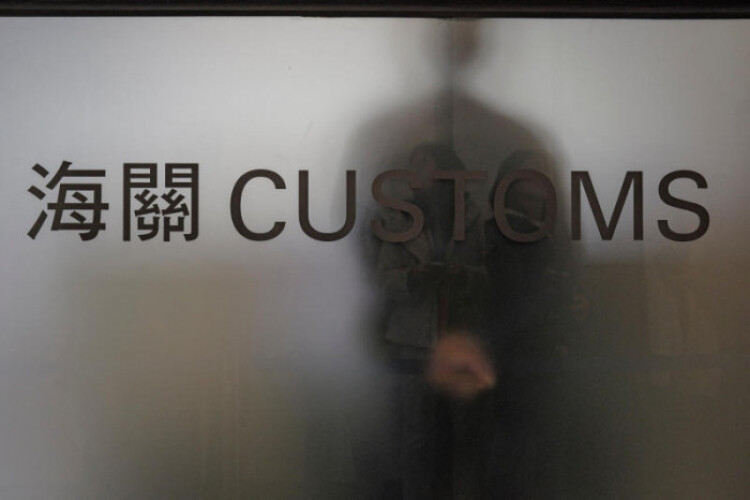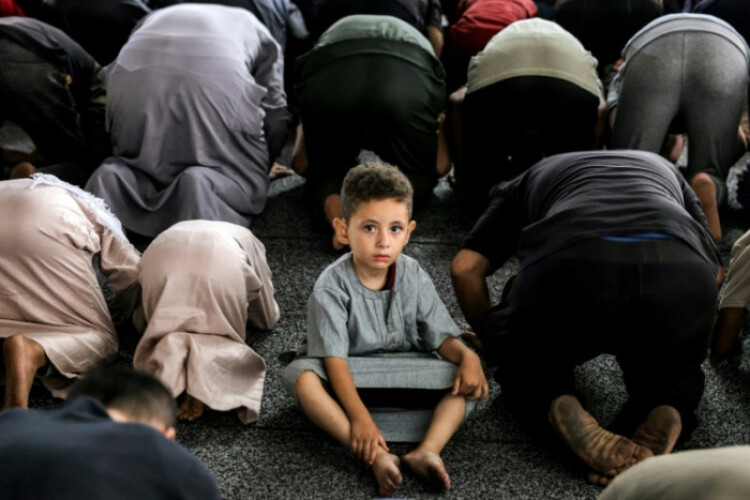
The number of non-local pregnant women refused entry at Hong Kong's borders for failing to have a local hospital booking has surged by five times since 2020, official figures show.
According to the Immigration Department, 1,154 non-local pregnant women were turned away at the border last year, the most since 2020. The figure was also five times higher than the 227 women recorded five years ago.
Director of Immigration Benson Kwok Joon-fung explained in a written reply to a lawmaker's question on Friday that his department had carried out checks on non-local pregnant women since 2013, when the government banned such arrivals who did not have a booking at a local hospital to deliver the baby.
"Under the relevant policies, non-local pregnant women who are at an advanced stage of pregnancy (28 weeks or above) are required to produce to immigration officers their confirmation certificates … [for a] delivery booking issued by private hospitals when they enter Hong Kong as visitors, otherwise they may be refused entry," Kwok said.
This "zero-quota" policy was launched to stop pregnant mainland Chinese women, whose husbands were not Hong Kong residents, from suddenly showing up at emergency wards to deliver babies and secure the right of abode for the child.
The city also recorded a rise in the number of non-local women giving birth last year. Among the 2,396 cases last year, 1,875, or 78%, were mainlanders, according to the department.
But the number of non-local deliveries in Hong Kong last year had yet to eclipse the 2,498 deliveries recorded in 2020. The latest figure was however noticeably higher than the tallies between 2021 and 2023, when the number remained below 2,000.
According to department data, 4,426 non-local women gave birth in Hong Kong in 2019, of whom 3,741, or 84.5%, were mainlanders.
As borders reopened following the end of the pandemic in 2023, the number of non-local pregnant women intercepted at checkpoints and invited for a secondary examination surged.
Department data showed that 20,006 non-local pregnant women were intercepted that year, or 40 times the 498 women recorded in 2022. The 12,203 women invited for secondary examination in 2023 was 25.4 times more than the 480 tallied in 2022.
A total of 49,709 pregnant mainland women were intercepted in 2019 before the pandemic.
The department issued a warning in 2023 saying arrivals could be barred from entering if their declared reason for doing so was not in line with the trip's purpose, after some mainland women said on social media they wanted to use visas issued as part of talent schemes to give birth in the city.
A South China Morning Post search on Chinese social media platform RedNote found more than 20 "guidelines" on how to do so. Many of the posts included the women saying they first obtained a talent visa to secure a Hong Kong identity card before making medical appointments.
Paul Yip Siu-fai, chair professor of population health at the University of Hong Kong, said intercepting or turning away heavily pregnant women on a tourist visa without proof of medical appointment was usual immigration procedure.
"This will happen in other countries too, as authorities wouldn't want them to hope to give birth during their trip," Yip explained. "Hong Kong's hospitals did not have enough capacity to cater to [the influx of non-local births] back then, so we had to stop."
While Yip said he would not be concerned about the post-pandemic surge in numbers, one could not assume all those turned away were gatecrashers seeking to give birth locally.
But the professor admitted the city's permanent residency and passport were still appealing to mainlanders, estimating that some of those who gave birth locally were the wives of talent visa holders or those whose husbands held a Hong Kong identity card.
"The Hong Kong passport … is still attractive to mainlanders. This is because Hong Kong passport holders face fewer restrictions with tourism," Yip said.
Non-local women whose husbands do not have a local identity card are barred from giving birth at private or public hospitals. Non-local women whose husbands hold residency rights can make private bookings for delivery.
Lawmaker Jesse Shang Hailong also noted it was common for mainland talent visa holders to be young couples.
While the lawmaker said families arriving through talent schemes might not all be aware of the requirement that heavily pregnant non-local women obtain a medical appointment before entry, he had not heard of any cases of the pregnant wives being turned away.
Lawmaker Doreen Kong Yuk-foon said Hong Kong's comprehensive medical care, education and welfare systems remained appealing to couples seeking a better future for their children.
But she said she was concerned about the impact on the city given its limited resources.
"Hong Kong is a small place. Can the city bear the impact of that many coming to the city to give birth?" she said.
Kong said some of those born in Hong Kong to non-local parents might not stay, adding she had also noticed some children with mainland parents were living only with a domestic helper, which she said was not healthy for their growth.
She urged the government to consider the city's long-term development and examine the reasons behind the surge.
Being born in Hong Kong does not itself confer any rights, as additional qualifications must be met.
Those born in Hong Kong who have Chinese nationality are entitled to permanent resident status, regardless of where their parents are from.
Babies born locally who are not of Chinese nationality may be entitled to permanent residency if one of their parents is a permanent resident.
In such cases, the entitlement to permanent residency is only valid up to the age of 21, and thereafter they must apply for qualification on their own.
Those who are neither Chinese nationals nor have a parent who is a permanent resident have no legal rights by virtue of being born in the city.
According to the Immigration Department, 1,154 non-local pregnant women were turned away at the border last year, the most since 2020. The figure was also five times higher than the 227 women recorded five years ago.
Director of Immigration Benson Kwok Joon-fung explained in a written reply to a lawmaker's question on Friday that his department had carried out checks on non-local pregnant women since 2013, when the government banned such arrivals who did not have a booking at a local hospital to deliver the baby.
"Under the relevant policies, non-local pregnant women who are at an advanced stage of pregnancy (28 weeks or above) are required to produce to immigration officers their confirmation certificates … [for a] delivery booking issued by private hospitals when they enter Hong Kong as visitors, otherwise they may be refused entry," Kwok said.
This "zero-quota" policy was launched to stop pregnant mainland Chinese women, whose husbands were not Hong Kong residents, from suddenly showing up at emergency wards to deliver babies and secure the right of abode for the child.
The city also recorded a rise in the number of non-local women giving birth last year. Among the 2,396 cases last year, 1,875, or 78%, were mainlanders, according to the department.
But the number of non-local deliveries in Hong Kong last year had yet to eclipse the 2,498 deliveries recorded in 2020. The latest figure was however noticeably higher than the tallies between 2021 and 2023, when the number remained below 2,000.
According to department data, 4,426 non-local women gave birth in Hong Kong in 2019, of whom 3,741, or 84.5%, were mainlanders.
As borders reopened following the end of the pandemic in 2023, the number of non-local pregnant women intercepted at checkpoints and invited for a secondary examination surged.
Department data showed that 20,006 non-local pregnant women were intercepted that year, or 40 times the 498 women recorded in 2022. The 12,203 women invited for secondary examination in 2023 was 25.4 times more than the 480 tallied in 2022.
A total of 49,709 pregnant mainland women were intercepted in 2019 before the pandemic.
The department issued a warning in 2023 saying arrivals could be barred from entering if their declared reason for doing so was not in line with the trip's purpose, after some mainland women said on social media they wanted to use visas issued as part of talent schemes to give birth in the city.
A South China Morning Post search on Chinese social media platform RedNote found more than 20 "guidelines" on how to do so. Many of the posts included the women saying they first obtained a talent visa to secure a Hong Kong identity card before making medical appointments.
Paul Yip Siu-fai, chair professor of population health at the University of Hong Kong, said intercepting or turning away heavily pregnant women on a tourist visa without proof of medical appointment was usual immigration procedure.
"This will happen in other countries too, as authorities wouldn't want them to hope to give birth during their trip," Yip explained. "Hong Kong's hospitals did not have enough capacity to cater to [the influx of non-local births] back then, so we had to stop."
While Yip said he would not be concerned about the post-pandemic surge in numbers, one could not assume all those turned away were gatecrashers seeking to give birth locally.
But the professor admitted the city's permanent residency and passport were still appealing to mainlanders, estimating that some of those who gave birth locally were the wives of talent visa holders or those whose husbands held a Hong Kong identity card.
"The Hong Kong passport … is still attractive to mainlanders. This is because Hong Kong passport holders face fewer restrictions with tourism," Yip said.
Non-local women whose husbands do not have a local identity card are barred from giving birth at private or public hospitals. Non-local women whose husbands hold residency rights can make private bookings for delivery.
Lawmaker Jesse Shang Hailong also noted it was common for mainland talent visa holders to be young couples.
While the lawmaker said families arriving through talent schemes might not all be aware of the requirement that heavily pregnant non-local women obtain a medical appointment before entry, he had not heard of any cases of the pregnant wives being turned away.
Lawmaker Doreen Kong Yuk-foon said Hong Kong's comprehensive medical care, education and welfare systems remained appealing to couples seeking a better future for their children.
But she said she was concerned about the impact on the city given its limited resources.
"Hong Kong is a small place. Can the city bear the impact of that many coming to the city to give birth?" she said.
Kong said some of those born in Hong Kong to non-local parents might not stay, adding she had also noticed some children with mainland parents were living only with a domestic helper, which she said was not healthy for their growth.
She urged the government to consider the city's long-term development and examine the reasons behind the surge.
Being born in Hong Kong does not itself confer any rights, as additional qualifications must be met.
Those born in Hong Kong who have Chinese nationality are entitled to permanent resident status, regardless of where their parents are from.
Babies born locally who are not of Chinese nationality may be entitled to permanent residency if one of their parents is a permanent resident.
In such cases, the entitlement to permanent residency is only valid up to the age of 21, and thereafter they must apply for qualification on their own.
Those who are neither Chinese nationals nor have a parent who is a permanent resident have no legal rights by virtue of being born in the city.










